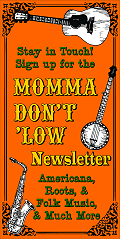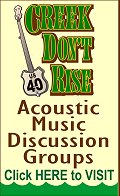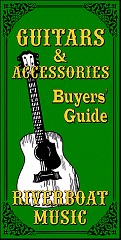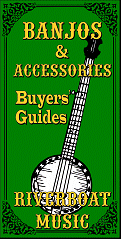
So Many Arts, So Little Time!
| Please Read: How to Help Our Site at No Cost to You - Some of our articles contain recommendations for products we like and vendors we personally trust. Some of those vendors may pay us a very small commission if you click on a link and buy their products. This costs you nothing at all and helps offset the costs of what we do. So if we point you to something you decide to buy later, please make certain you come back through our site and click on the link directly. Thanks. |
| This Site is a Cookie-Free Zone - Except for discussion forums that you have to expressly register for, none of our pages use cookies of any kind. Some of the vendors we link to do, but that won't affect you unless you click on a link to their pages. Your continued use of this page indicates that you agree to our policy. For details, click here. |



|


What is Folk?TM
Most of this site has to do with "Folk Music" and related topics, but I need to say that the term "Folk" refers to all kinds of arts, including "Folk Art," "Folk Dancing," and even "Mumming."
One definition of Folk is that it identifies any cultural practice that is passed down through generations by word of mouth, often with each generation adding its own flourishes.
So the historic tattoo patterns of Pacific Islanders have Folk origins. As do the Three Kings leaving treats in children's shoes, campground guitarists leading "Do Lord," campfire ghost stories, "Morris Dancers," Japanese tea ceremonies, Folk quilt patterns, and Grandma Moses' famous "Folk paintings."
It would be fair to say that many people who practice Folk traditions today did not learn them from their ancestors, but from other people who made a point of recording or at least studying Folk traditions.
For example, Folk musicians like Noel Stookey, the Kingston Trio, and the Limelighters, learned most of the Folk songs they performed, not from their ancestors or trips to the backwoods, but from the works of researchers like Alan Lomax and the songs of earlier musicians like the Weavers. Does that make their "Folk" tradition any less valid? I hope not, because I learned most of my Folk repertoire from musicians like them.
Some would say that "Irish dancing" has left the "Folk" tradition because it is being taught in schools and even celebrated on Broadway, but I wouldn't be among them.
To me, the important thing about carrying Folk traditions forward is respect for the past, while trying to keep any modern "enhancements" to those arts within the general parameters of the genre.
Purists might disagree, and you'll encounter them if you practice ANY Folk art. For example, I learned banjo in the 1960s when a dozen different styles were being played, but today only two styles are "permitted" in banjo circles. Because I pick in a style that was the most popular style 130 years ago, but fell out of practice by the 1940s, banjo players from both "schools" claim that I play banjo "wrong." It doesn't keep me up nights.
If you practice any Folk art you'll soon meet similar naysayers. Don't waste time debating them; just perfect your art and people who are honest and willing to learn will eventually crowd out the complainers.
 Forgotten Folk Arts - Countless Folk arts that were once common have fallen to obscurity in recent years.
Forgotten Folk Arts - Countless Folk arts that were once common have fallen to obscurity in recent years.
Here's one: In the 1800s to mid-1900s, families would build elaborate houses and barns for their kids to play with outdoors, even sometimes modeling a real-world setting. By the 1950s, most families had access to "store-bought" dollhouses and farm sets, so the tradition died a slow death.
Today, countless individuals and Asian factories produce ornamental "bird houses" that somewhat resemble the old home-made buildings, but they're not really backyard homes for hand-carved people and animals. In fact most of the factory-produced ones don't really hold up outside. So the inspiration may still be there, but the art has largely fallen by the wayside.
 Similarly, "tramp art" rose to its peak when Depression-era homeless men used found materials and pocket-knives to craft products they could sell door-to-door to raise money for their next meal. Today, some folks collect it, but hardly anyone makes it any more.
Similarly, "tramp art" rose to its peak when Depression-era homeless men used found materials and pocket-knives to craft products they could sell door-to-door to raise money for their next meal. Today, some folks collect it, but hardly anyone makes it any more.
How many similar, delightful Folk arts have fallen by the wayside simply because people stopped practicing them? With synthesizers dominating pop music, guitar playing might be considered a "folk art" in twenty years. Or painting with real paint and paintbrushes.
Don't take anything for granted or consider any Folk art "beneath you."
Approaching Folk Arts
- Reserve Judgment.
"Folk" means a lot of things to a lot of people, many of whom are fanatically attached to one or two aspects, but that shouldn't keep anyone from hanging and sharing information with people who have different interests.
Any Folk artist you meet will like aspects of the art that don't appeal to you and think some of what you do is silly or unfaithful to their vision of the tradition. And vice versa.
Your goal, as a Folk artist of any kind is to bridge gaps, even within the Folk community.
- Encourage Everybody.
Everyone you meet in your Folk art circle is at a different stage in their journey, and many are crafting, dancing, singing, or painting for reasons that you don't even know.
Encourage everybody - even folks who are "better" than you. Yes, you will meet some narcissists who just take your kind words as a sign that you are bowing to their superiority, but you have no idea what obstacles most folks you meet are dealing with. And some of the most accomplished are in the most need of encouragement.
Mutual encouragement has contributed greatly to the growth of many Folk movements.
- Learn.
If you're, say, a crafter selling thins you make at craft shows, you may not feel that the person two booths over has anything to teach you. Learn from them anyway - you'll only grow in your craft, whatever it is.
- Teach.
Even if you have just made a little bit of progress, there are always things you can help the next person with. Building an arts community is more important than trying to stay a step ahead of people you think of as potential "competition."
And you will grow your own skills faster if you teach, I guarantee.
- Keep Doing
Whatever your art, keep doing it. Here's an irony - years ago an experiment in middle-school writing proved that students with a lot of writing assignments and no particular evaluation actually improved their writing faster than students with a few assignments and frequent, detailed evaluation. I would bet that the same thing applies to nearly every art.
Yes, I'm all in favor of lessons and classes, but even if you don't have those, the more you dance, paint, write, play, etc., the better you get, and the more likely you are to develop a signature style.
- Hang With Similar-Minded Folk Artists
Some communities have clubs or organizations focusing on the sort of Folk art you're interested in. In other regions, you'll have to make your own community. Or you MAY find community online. Yes, you'll encounter trolls and narcissists, but most folks just want to learn and share.
And you may get encouragement where you least expect it.
Conclusion
These suggestions are just a start, of course. But for all of their variations and even contradictions, Folk arts are rewarding in themselves, and the more you practice them, the more you'll get out of them as well.Moreover, be certain to bring other folks along for the ride. Some will get off at the first stop, true, but some will be glad to join you for the long haul.
Sister Sites
 Other sites we started to keep this site from getting too big to be useful include:
Other sites we started to keep this site from getting too big to be useful include:
- CreekDontRise.com is a repository of articles about Folk music and the instruments on which it has been traditionally played.
The "Acoustic" page includes a long list of articles including maintenance and playing tips on all sorts of traditional acoustic instruments.
 RiverboatMusic.com is a buyers' guide for acoustic and traditional instrument from a musician's point of view, focusing on the uses, reliability, and practicality of various instruments, and not just the marketing hype about the shape of the fret markers or whatever.
RiverboatMusic.com is a buyers' guide for acoustic and traditional instrument from a musician's point of view, focusing on the uses, reliability, and practicality of various instruments, and not just the marketing hype about the shape of the fret markers or whatever.
For instruments like dulcimers that have mostly small manufacturers or cheap imports, we try to tell you what to look for, irrespective of brand.
 Momma Don't 'Low includes a free e-mail newsletter that discusses all of those topics above and more. We plan to include other features as time permits.
Momma Don't 'Low includes a free e-mail newsletter that discusses all of those topics above and more. We plan to include other features as time permits.
Note - If you wish to sign up for our newsletter and ask a question at the same time, please click on the Momma Don't 'Low newsletter button to learn more and to get a link to our signup form.
 PaulRaceMusic.com is the "landing page" for Paul's own musical endeavors, plus many memoirs and blogs about music and the music business.
PaulRaceMusic.com is the "landing page" for Paul's own musical endeavors, plus many memoirs and blogs about music and the music business.
 ClassicTrainSongs.com describes railroad songs that every train lover should know. Or at least know about.
ClassicTrainSongs.com describes railroad songs that every train lover should know. Or at least know about.
- SchoolOfTheRock.com has articles about Christian music, Christian music careers and performance, Christian living in general, and vintage saxophones, another of Paul's interests. This site has separate newsletters, etc., by the way - there isn't a lot of overlap with the Momma Don't 'Low(tm) newsletters.
For information about other music collections and projects, check the links at the bottom of this page.
 Whatever else you get out of our pages, I hope you come away with some great ideas for "sharing the joy."
Whatever else you get out of our pages, I hope you come away with some great ideas for "sharing the joy."
And please stay in touch!
All material, illustrations, and content of this web site is copyrighted (c) 2001, 2002, 2003, 2004, 2005, 2006,
2007, 2008, 2009, 2010, 2011, 2012, 2013, 2014, 2015, 2016, 2017, 2018, 2019, 2020, 2021, 2022, 2023 by Paul D. Race. All rights reserved.
Creek Dont' RiseTM is a participant in the Amazon Services LLC Associates Program, an affiliate advertising
program designed to provide a means for sites to earn advertising fees by advertising and linking to Amazon.com.
For questions, comments, suggestions, trouble reports, etc. about this page or this site, please contact us.
| Visit related pages and affiliated sites: | |||||
| - Music - | |||||

|
 |
 |

|

|

|

|

|

|

|

|

|

|

|

|

|

|

|
| - Trains and Hobbies - | |||||
 |

|

|  |
 |

|
| - Christmas Memories and Collectibles - | |||||
 |

|
 |

|
 |

|
| - Family Activities and Crafts - | |||||
 |

|

|

|

|

|

